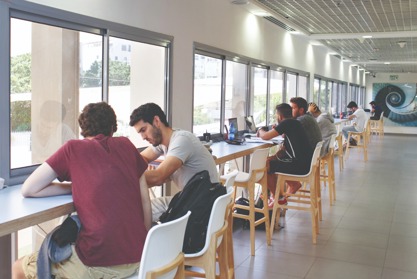

Academia Reinvents Itself: “Shark Tanks” as an Evaluation Tool and Projects that Roll Over into Multiple Courses
Escape rooms, video animations, and students writing their own assignments. To provide future engineers with skills and tools, pedagogy must innovate. How to enlist the academic faculty in this change, and how to turn the syllabus into a skillabus? Transforming engineering education is at the heart of these innovative efforts.
Animation in physics courses, a digital escape room as team assignment in chemistry, and an outside Shark Tank-style committee for examining and evaluating industrial engineering and management projects. These are just some examples of the changes implemented this year to the teaching and evaluation processes at Afeka – the Academic College of Engineering in Tel Aviv. The syllabus itself also looks different: alongside the science and engineering knowledge, you’ll find quite a few learning outcomes related to personal and professional skills, while providing the tools that teach students how to learn, as well as a whole set of values.
These and many other changes form the implementation of the “Afeka Framework”. It is clear today that academia, and the entire educational continuum from kindergarten to degree, must change. There is also a direction to follow – what Afeka College terms “the desired figure of the alumnus”. Now, in order for these critical insights to matter, it is time for the HOW: How to acquire and develop the vital skills which, in our rapidly-changing world and especially the industry, we cannot do without?
Prof. Anat Ratnovsky, Afeka’s vice president for academic affairs, describes a sweeping process that includes an update of all syllabi – a skillabus – as well as of the learning methods. “We’ve set the goal of teaching every student vital skills through the academic courses, in their three or four years until graduation. In a lengthy process of research and consultation, including with the industry, we’ve identified several vital skills and defined three levels for each – basic, intermediate, and advanced. No course at Afeka was left unchanged.” The syllabus was expanded to include learning and experience in the world of skills – a skillabus, as Afeka calls it, since it includes the skills that are taught at the courses and which evolve year to year.
“In order for creativity to flow, we’ve told the faculty: don’t put budgetary or technological limitations on yourselves; ‘go crazy’ with your fantasies, and let us rack our brains on how to make it a reality,” says Prof. Ratnovsky, adding: “In a long process that included significant support and guidance, we’ve achieved amazing results in innovative pedagogy, which allows students to learn the same material much more interestingly and tangibly.”
Transforming Engineering Education: A New Approach to Learning
Change is always a challenge, certainly in academia, which tends to cleave to its traditions. “Open dialogue and cross-pollination among faculty has turned out to be a major asset, allowing to enlist faculty members in promoting change, thinking outside the box, and creating pedagogic innovation,” says Prof. Ratnovky. To help this process, Afeka has built The Center for the Promotion of Teaching (headed by Dr. Irma Jan and with the collaboration of techno-pedagogic experts), which guides each faculty member personally. Additionally, multidisciplinary teaching committees were appointed, workshops and courses for lecturers were created, and once a year there is a large conference with TED-style talks by faculty members on successful experiences that colleagues should adopt.
The result, in a process that is still ongoing, is an upgraded and creative curriculum, classrooms that extend beyond the campus, and new learning spaces, including open-air ones – an initiative that will only grow when Afeka relocates to its new Yad Eliyahu campus. One of the creative outcomes of this process is the “rolling project”, in which a series of students each take over a project in turn, as indeed happens in the industry. This means that each link in the chain must hit the ground running midway through, get a firm grasp on what’s been done, and define precise plans and needs for those who will succeed it. Another version of the rolling project is a final assignment for an advanced specialization course, where the assignment is based on several projects from previous courses. Other interesting practices that change perspectives and call for deeper understanding include: Letting students in math courses write their own assignments; a vehicle structure lesson taught on a truck, in order to understand and illustrate the topic with extreme precision; a driving lab held on a real racecourse; and a renewable energy seminar next to the solar farm the at Eilat-Eilot compound. And towards the end of the academic year, Afeka students can sign up for a special sailing course for engineers, provided as part of Afeka’s Social and Humanities unit along with other fascinating courses adapted for specific learning outcomes. The sailing course provides students with the understanding and application of engineering principles, as well as skills of real-time problem-solving and teamwork, enabling them to strive for excellence at sea and on land. Add to this frequent industry visits, collaborations, flipped classrooms, and courses built around PBL (project-based learning).
Stepping Out of the Comfort Zone
“The need to teach skills,” says Prof. Ratnovsky, “also requires Afeka, which educates engineers, to adopt mind-broadening curricula from other content realms, such as philosophy, history, and anything that will make students open their minds and step out of their comfort zones. Other areas of focus are languages – Hebrew, English, and programming; written and oral communication; self-learning and integrative learning; and even values such as ethical reasoning and civic engagement.” Prof. Ratnovsky notes that change is a slow, endless process, and that the present syllabus will clearly continue to change and evolve in step with pedagogic innovation. This ongoing process of transforming engineering education is crucial for preparing students for the challenges of the modern industry.
And what of the response from the target audience – the students themselves? “The feedback we receive from alumni in general and the Alumni Department and Career Center in particular, shows that when they enter the industry, they feel readier to face the challenges – both in terms of the skills they’ve acquired and in terms of technologies, experiences they’ve had, and the ‘portfolio’ they’ve built during their degree. From there they move ahead quickly and stand out professionally. Beyond that, the learning experience itself has become enjoyable, and the campus is thriving.”




Transforming Engineering Education
Share a link using:
https://external.afeka.ac.il/en/afeka-news/magazine/transforming-engineering-education/WhatsApp
Facebook
Twitter
Email
https://external.afeka.ac.il/en/afeka-news/magazine/transforming-engineering-education/